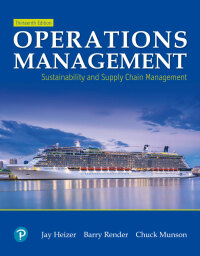1. What are the sources of pressure on firms such as Frito-Lay to reduce their environmental footprint?...
Question:
1. What are the sources of pressure on firms such as Frito-Lay to reduce their environmental footprint? Frito-Lay, the multi-billion-dollar snack food giant, requires vast amounts of water, electricity, natural gas, and fuel to produce its 41 well-known brands. In keeping with growing environmental concerns, Frito-Lay has initiated ambitious plans to produce environmentally friendly snacks. But even environmentally friendly snacks require resources. Recognizing the environmental impact, the firm is an aggressive “green manufacturer,”
with major initiatives in resource reduction and sustainability.
For instance, the company’s energy management program includes a variety of elements designed to engage employees in reducing energy consumption. These elements include scorecards and customized action plans that empower employees and recognize their achievements.
At Frito-Lay’s factory in Casa Grande, Arizona, more than 500,000 pounds of potatoes arrive every day to be washed, sliced, fried, seasoned, and portioned into bags of Lay’s and Ruffles chips.
The process consumes enormous amounts of energy and creates vast amounts of wastewater, starch, and potato peelings. Frito-
Lay plans to take the plant off the power grid and run it almost entirely on renewable fuels and recycled water. The managers at the Casa Grande plant have also installed skylights in conference rooms, offices, and a finished goods warehouse to reduce the need for artificial light. More fuel-efficient ovens recapture heat from exhaust stacks. Vacuum hoses that pull moisture from potato slices to recapture the water and to reduce the amount of heat needed to cook the potato chips are also being used.
Frito-Lay has also built more than 50 acres of solar concentrators behind its Modesto, California, plant to generate solar power. The solar power is being converted into heat and used to cook Sun Chips. A biomass boiler, which will burn agricultural waste, is also planned to provide additional renewable fuel.
Step by Step Answer:

Operations Management: Sustainability And Supply Chain Management
ISBN: 9780135225899,9780135202722
13th Edition
Authors: Jay Heizer; Barry Render; Chuck Munson






